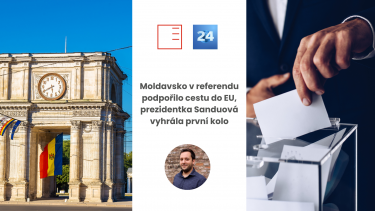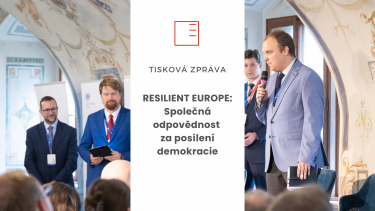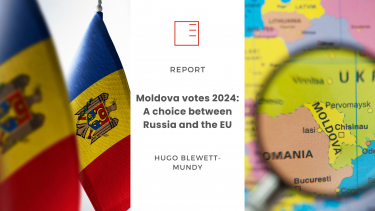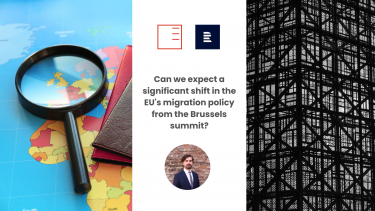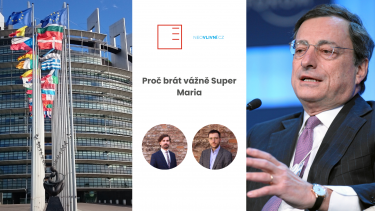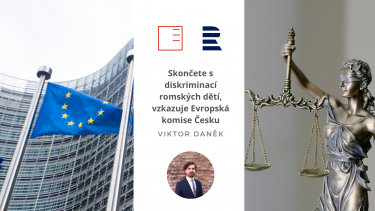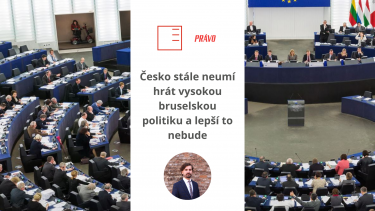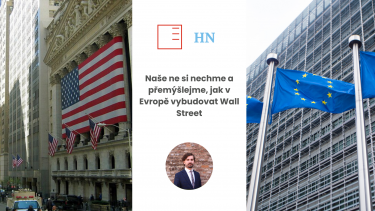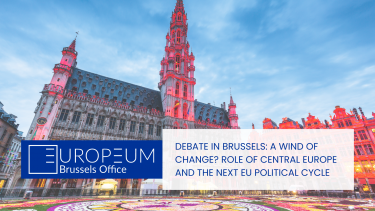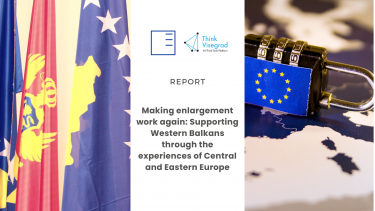ČT24 | Moldova's referendum supports path to the EU, President Sandu wins first round
Moldovans voted in Sunday's referendum to constitutionally anchor EU accession as a goal for the country. After counting the votes cast, voters decided by a narrow majority to support the country's Western orientation. Current pro-EU President Maia Sandu, who won the most votes in the first round of the simultaneous presidential election, accused "criminal groups" of undermining the referendum. The second round of the head of state election will take place on 3rd November. Žiga Faktor, deputy director of the EUROPEUM Institute and head of Brussels office, commented for ČT24.
Show more
Press Release | RESILIENT EUROPE: A shared responsibility to strengthen democracy
Together with the Association for International Affairs and EUROPEUM Institute for European Policy, the Centre for an Informed Society has prepared a series of Resilient Europe events from 8 to 10 October 2024. This was a forum aimed at strengthening strategic communication and countering disinformation. It aimed to share best practices from different countries and learn from their successes and mistakes in strengthening democratic principles, countering authoritarianism and populism, and uniting society against divisive influences.
Show more
Report | Moldova votes 2024: A choice between Russia and the EU
Moldova stands at a critical juncture that will determine its position within Europe. In the elections on Sunday, the incumbent president Maia Sandu is seeking a second term and a positive result in the EU accession referendum to reaffirm her country’s path towards Europe. But the hybrid threat facing Moldova from Russia will not dissipate, particularly as next year’s pivotal parliamentary elections approach in the tiny former Soviet republic. Hugo Blewett-Mundy, a non-resident associate research fellow from EUROPEUM, analyses the current situation in Moldova and provides an outlook for the country in 2025.
Show moreČRo Radiožurnál | Can we expect a significant shift in the EU's migration policy from the Brussels summit?
The EU Summit started in Brussels this morning and one of its key points is to be further assistance for Ukraine. President Volodymyr Zelensky is in attendance and has presented a "victory plan" which includes strengthening Ukraine's military capabilities. A particularly heated discussion is expected around adjustments to EU migration and asylum policy. Shortly before the start of the summit, representatives of several countries, including the Czech Republic, were due to hold an emergency meeting to reconcile their positions in this area. Viktor Daněk, deputy director of EUROPEUM Institute, commented on the current events on Czech Radio broadcast.
Show moreNeovlivní.cz | Why take Super Mario seriously
Radical reforms or slow agony. This is the choice facing Europe if it is not to continue to fall behind its American and Chinese competitors, according to a recently published analysis by renowned economist and politician Mario Draghi. Viktor Daněk, deputy director, and Filip Křenek, project coordinator and analyst at the EUROPEUM Institute, commented for Neovlivní.cz.
Show more
Český rozhlas | End discrimination against Roma children, says the European Commission to the Czech Republic
According to the European Commission, the Czech Republic is not complying with EU legislation on combating racial and ethnic discrimination. Brussels has therefore initiated infringement proceedings. It claims that the Czech Republic is not effectively addressing the problem of segregation of Roma children in schools. Deputy director at EUROPEUM Institute Viktor Daněk commented for Český rozhlas.
Show morePrávo | The Czech Republic still can't play high Brussels politics and it won't get any better
The story of the assignment of the international partnership agenda to Czech EU Commissioner Jozef Síkela, which ended in disappointment for many, teaches one lesson that will be hard to digest in government circles: the Czech Republic still does not know how to play high Brussels politics and it will not get better. Deputy director of EUROPEUM Institute Viktor Daněk commented for deník Právo.
Show more PNGHospodářské noviny | Let's keep our no and think about how to build Wall Street in Europe
Europe has a problem compared to other large economies in the world. It is lagging behind. What to do about it? The new European Commission has changed priorities compared to the previous one - more on the economy, less on the climate. How does this suit the Czech Republic and how should it approach it? Deputy director of EUROPEUM Institute Viktor Daněk commented for podcast Ranní brífink of Hospodářské noviny.
Show moreDebate in Brussels | A wind of change? Role of Central Europe and the next EU political cycle
As the dust settles after a hectic period of post-election negotiations, Von der Leyen’s second Commission is faced with serious economic challenges. Recent reports of Draghi and Letta have clearly indicated that the EU is lagging behind other global powers in the areas of growth and competitiveness and this is reflected in the composition of the College as well as within strategic priorities for the next political cycle. Come listen and debate about challenges EU is facing!
Show more
Report | Making enlargement work again: Supporting Western Balkans through the experiences of Central and Eastern Europe
On September 12th, EUROPEUM’s Brussels Office organized a public conference titled “Making enlargement work again: Supporting Western Balkans through the experiences of Central and Eastern Europe”. Following a keynote speech by H.E. Bálint Ódor, the panel discussions dwelled on the 2004 enlargement, its impacts on the EU and the lessons learned from the process through the perspective of current EU accession of the countries of Western Balkans.
Show more
Staroměstské náměstí 4/1
Prague 1 - Staré Město
110 00
tel.: +420 212 246 552
email: europeum@europeum.org
https://www.europeum.org
